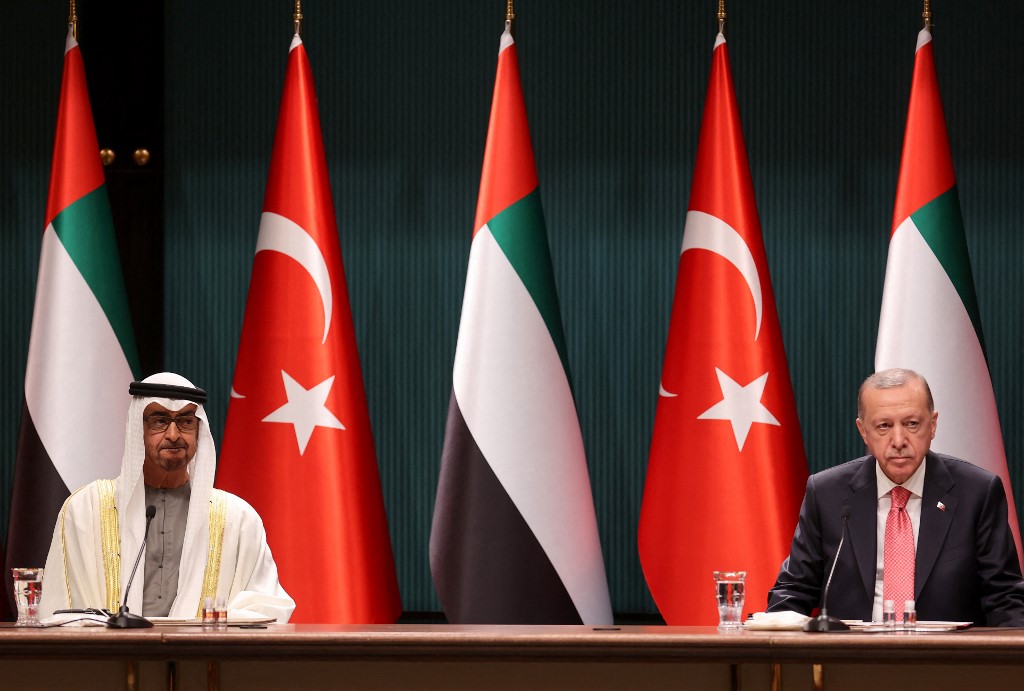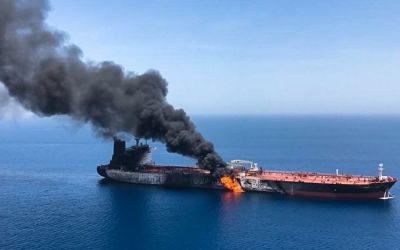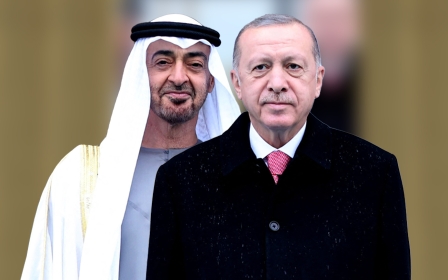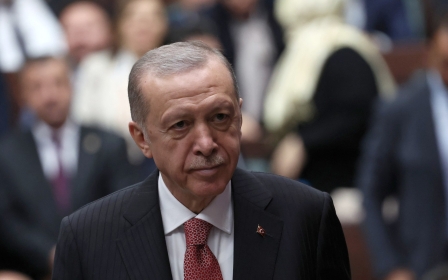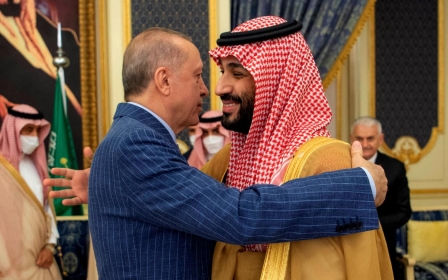How Turkey has become a major player in Gulf regional security
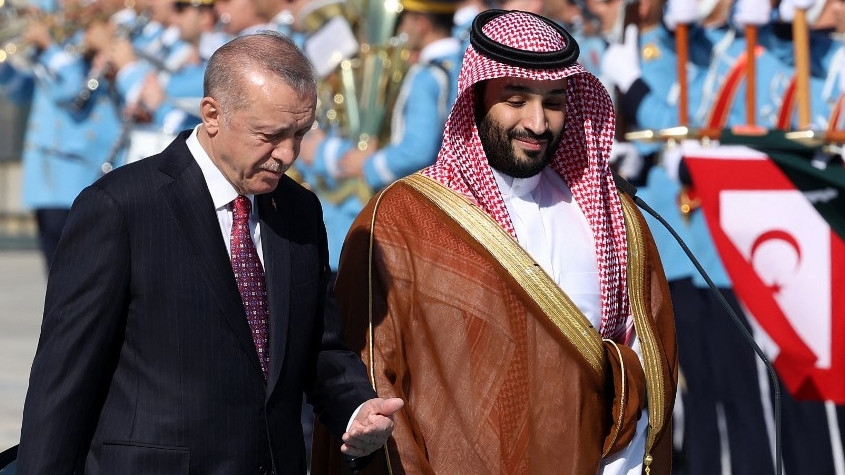
Over the past decade, there has been much debate about the security architecture of the Gulf region. This discussion has been largely shaped by the emerging great power competition involving the US, China and Iran.
Several critical developments during this period, including the 2011 Arab uprisings, the outbreak of Yemen’s war in 2014, the 2017 blockade of Qatar, and Iran’s targeting of Saudi oil facilities in 2019, convinced Gulf Cooperation Council (GCC) countries that neither traditional American security guarantees, nor a growing shopping list of arms, would protect them against emerging threats.
The erosion of the American role as the region’s primary security guarantor has forced Arab Gulf states to pursue a diversification strategy, which aims to secure broader cooperation with a host of countries, especially in the security realm. The US pivot to Asia and Washington’s declining power have changed the Gulf’s security construct, introducing newcomers and fuelling speculation over their potential role.
Several countries, including China, India and Russia, have been under the spotlight in this context. But one regional heavyweight has been excluded from much of the discussion, even though it is the only actor that has played a noticeable and direct hard-security role in the Gulf amid the US pivot to Asia. This actor is Turkey.
When the Justice and Development Party (AKP) ascended to power in Turkey in 2002, it launched a new, multi-dimensional and self-confident foreign policy, which has elevated the country’s status, role and influence, both regionally and internationally. Turkish foreign policy has been formulated with reference to a holistic understanding of geography, history and active agency. The Middle East in general, and the Levant and Gulf in particular, have occupied a critical status in Turkey’s ambitious vision.
New MEE newsletter: Jerusalem Dispatch
Sign up to get the latest insights and analysis on Israel-Palestine, alongside Turkey Unpacked and other MEE newsletters
Although this vision has remained constant in the country’s strategic planning, and in the writings of various elites and decision-makers, Turkey’s foreign policy approach shifted after the 2011 Arab uprisings from soft power to hard power, in response to the changing security environment and increasing regional threats. As such, Turkey sought to play a greater regional security role and to increase its direct hard-security presence abroad.
During the past decade, Turkey’s security-oriented role in the Gulf has been largely shaped by critical internal, regional and international dynamics. Regional insecurity, the GCC’s structural vulnerabilities and reliance on outside protection, and the reduction in Washington’s security commitments to the Gulf all contributed to Ankara’s increasing security role in the region.
Elevated role
The Turkish establishment’s desire to seek an elevated security role for Ankara in the Gulf region was also influenced by the country’s internal dynamics, including the rise of its homegrown defence industry and its drive for an autonomous foreign policy.
The manifestation of Turkey’s aspiration to play a greater security role in the Gulf region was manifested in the creation of its first Middle Eastern military base, located in Qatar. During the 2017 Gulf crisis, Turkish President Recep Tayyip Erdogan revealed that he proposed to Saudi Arabia’s King Salman the establishment of a Turkish military base on Saudi soil at least two years before the crisis. Ankara links the security, stability and prosperity of the Gulf region to that of Turkey.
The fault lines and rifts between Turkey and some GCC countries matter less than their shared interests and regional strategic imperatives
Between 2011 and 2016, GCC nations became more interested in developing defence and military relations with Ankara. The Turkey-GCC defence engagement seemed complementary, with Turkey’s rising indigenous defence industry capacities and large GCC defence budgets.
During this period, Turkey and GCC states signed key defence agreements, and Ankara significantly increased its arms exports to Arab Gulf countries: between 2012-2016, the UAE and Saudi Arabia ranked second and third on the list of clients for Turkey’s defence exports, representing around 20 percent each.
The year 2014 marked the birth of a unique relationship between Qatar and Turkey. The two parties strengthened their defence and military ties, resulting in the construction of the aforementioned military base.
Between 2017 and 2021, Oman emerged as Turkey’s biggest recipient of arms exports, representing 16 percent of the total. Qatar was third with 14 percent. These figures underline that there is room for more in the future, especially if Turkey maintains its rapid pace of developing its local defence industry.
A key player
The 2017 Gulf crisis remains the most visible and credible indicator of Turkey’s ambitions to play an enhanced security role in the Gulf. Ankara defended Doha when Washington was hesitant and the US administration divided, with the American president inciting against Qatar. Although symbolic, the deployment of Turkish troops to Doha deterred the blockading countries from militarising the crisis, foiling any possible invasion plans.
The Gulf crisis accelerated the geo-strategic component of Ankara’s Gulf policy, with Turkey becoming a key player in the security of the Gulf region for the first time since the collapse of the Ottoman Empire a century ago.
Although Turkey’s relations with some GCC countries endured difficulties, setbacks and even crises between 2017 and 2020, the 2021 Al-Ula agreement between the Saudi-led bloc and Qatar, which ended the Gulf crisis, paved the way for the normalisation of relations between Turkey and both the UAE and Saudi Arabia.
This development showed how the fault lines and rifts between Turkey and some GCC countries matter less than their shared interests and regional strategic imperatives, which necessitate cooperation and coordination.
Yet, GCC states are rarely all on the same page about any regional issue at any given time. While some might endorse an upgraded Turkish security role in the Gulf (mainly Qatar, Kuwait and Oman), others might not be as eager - Saudi Arabia, for example.
Regarding Iran, while the Gulf crisis pushed Ankara closer to Tehran with the goal of helping Qatar to overcome the blockade, the Iranians were not pleased that Turkey was developing a bigger economic and security role in the Gulf. During the early days of the blockade, Iranian authorities obstructed the passage of Turkish trucks carrying food and goods to Qatar, citing bureaucratic procedures.
Likewise, the Iranians were not happy with Turkey’s direct military presence in the Gulf via Qatar, expressing concerns over the possible permanent deployment of Turkish jets in Doha.
Challenges ahead
Extra-regional actors, such as China, Russia and even India, could also pose a challenge to Turkey’s upgraded security role in the Gulf in future. These countries have their own understanding of security in the Gulf, often manifested in new concepts and policy papers, alongside deeper political, economic and security relationships with GCC members.
These states have larger economies and defence industries than Turkey, and hence more capacity to tolerate the costs associated with securing the Gulf region. India and China in particular also have stronger motives to play a bigger role in the Gulf and to be a part of security arrangements in this region.
GCC states see these extra-regional actors as effective hedging partners vis-a-vis the declining US, especially in the case of China. Unlike Turkey, these extra-regional countries are nuclear powers, and two of them, China and Russia, are members of the United Nations Security Council with veto capabilities. In this sense, Turkey is seen as a less powerful player.
In a highly volatile and unstable region, the question of the future is difficult to tackle, especially with countless variables involved. There is currently a significant gap between Turkey’s capabilities and those of its extra-regional competitors, on both economic and military levels.
Yet, Turkey’s geographic proximity, its willingness to share defence technology, and its reputation as a reliable, committed, credible and capable partner over the past decade could provide it with leverage over its competitors, enabling Turkey to play an upgraded security role in the Gulf.
If the current trend of US detachment from the region continues, and Turkey’s rising regional posture keeps moving in a forward direction, Ankara may have an opportunity to fortify its position in the Gulf.
That being said, the internal, regional and international dynamics at play should always be taken into account, as they have the capacity to hinder Ankara’s ambitions in this regard. Turkey must stabilise its internal politics, boost its economic power, and significantly increase its business interactions with Gulf countries in order to compete with extra-regional actors and facilitate a possible enhanced security role for itself in the future.
This article is extracted from the author’s most recent scholarly work titled: “Turkey’s security role in the Gulf region: exploring the case of a newcomer”. It was rewritten and modified to suit this format.
The views expressed in this article belong to the author and do not necessarily reflect the editorial policy of Middle East Eye.
Middle East Eye delivers independent and unrivalled coverage and analysis of the Middle East, North Africa and beyond. To learn more about republishing this content and the associated fees, please fill out this form. More about MEE can be found here.



